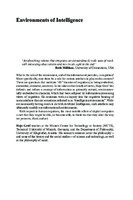Environments of Intelligence
From Natural Information to Artificial Interaction
| dc.contributor.author | Greif, Hajo | |
| dc.date.accessioned | 2019-11-27 10:46:55 | |
| dc.date.accessioned | 2020-04-01T09:51:56Z | |
| dc.date.available | 2020-04-01T09:51:56Z | |
| dc.date.issued | 2017 | |
| dc.identifier | 1005874 | |
| dc.identifier | OCN: 1135845514 | en_US |
| dc.identifier.uri | http://library.oapen.org/handle/20.500.12657/24257 | |
| dc.description.abstract | What is the role of the environment, and of the information it provides, in cognition? More specifically, may there be a role for certain artefacts to play in this context? These are questions that motivate "4E" theories of cognition (as being embodied, embedded, extended, enactive). In his take on that family of views, Hajo Greif first defends and refines a concept of information as primarily natural, environmentally embedded in character, which had been eclipsed by information-processing views of cognition. He continues with an inquiry into the cognitive bearing of some artefacts that are sometimes referred to as 'intelligent environments'. Without necessarily having much to do with Artificial Intelligence, such artefacts may ultimately modify our informational environments. With respect to human cognition, the most notable effect of digital computers is not that they might be able, or become able, to think but that they alter the way we perceive, think and act. The Open Access version of this book, available at http://www.tandfebooks.com/doi/view/10.4324/9781315401867, has been made available under a Creative Commons CC-BY licence | |
| dc.language | English | |
| dc.relation.ispartofseries | History and Philosophy of Technoscience | |
| dc.subject.classification | thema EDItEUR::N History and Archaeology::NH History | en_US |
| dc.subject.classification | thema EDItEUR::Q Philosophy and Religion::QD Philosophy::QDT Topics in philosophy::QDTM Philosophy of mind | en_US |
| dc.subject.classification | thema EDItEUR::P Mathematics and Science::PD Science: general issues::PDA Philosophy of science | en_US |
| dc.subject.classification | thema EDItEUR::P Mathematics and Science::PD Science: general issues::PDR Impact of science and technology on society | en_US |
| dc.subject.classification | thema EDItEUR::U Computing and Information Technology | en_US |
| dc.subject.other | Alfred Nordmann | |
| dc.subject.other | History of Science | |
| dc.subject.other | History of Technology | |
| dc.subject.other | History since 1800 | |
| dc.subject.other | Manipulation | |
| dc.subject.other | Measurement | |
| dc.subject.other | Modern History | |
| dc.subject.other | Philosophy of Science | |
| dc.subject.other | Philosophy of Technology | |
| dc.subject.other | Rob Langham | |
| dc.subject.other | Scientific Ethics | |
| dc.subject.other | Visualisation | |
| dc.title | Environments of Intelligence | |
| dc.title.alternative | From Natural Information to Artificial Interaction | |
| dc.type | book | |
| oapen.abstract.otherlanguage | Vor dem Hintergrund philosophischer und kognitionswissenschaftlicher Betrachtungen des Denkens als verkörpertem, erweitertem, umwelt- und handlungsgebundenem Prozess wird zunächst ein Konzept von Information als primär natürliche, objektive Beziehung in der Umwelt verteidigt und eine Theorie “informationaler Umwelten” entwickelt. In einem zweiten Schritt werden sogenannte “intelligente Umwelten” als Paradigma der technologischen Formbarkeit solcher informationaler Umwelten untersucht. Anders als im Fall der klassischen Künstlichen Intelligenz liegt der bemerkenswerteste mögliche Effekt dieser Technologien weniger darin, dass sie selbst denkfähig wären oder werden könnten, sondern dass sie die Art und Weise verändern, auf welche Menschen wahrnehmen, denken und handeln. | |
| oapen.identifier.doi | 10.4324/9781315408101 | |
| oapen.relation.isPublishedBy | 7b3c7b10-5b1e-40b3-860e-c6dd5197f0bb | |
| oapen.relation.isbn | 9781138222328; 9780367348717;9781315408095; 9781315408071 | |
| oapen.collection | Austrian Science Fund (FWF) | |
| oapen.imprint | Routledge | |
| oapen.pages | 231 | |
| oapen.redirect | 1001526 | |
| oapen.notes | 2019-11-27 10:45:47, Austrian Science Fund PUB 488 | |
| oapen.identifier.ocn | 1135845514 | |
| peerreview.anonymity | Single-anonymised | |
| peerreview.id | bc80075c-96cc-4740-a9f3-a234bc2598f1 | |
| peerreview.open.review | No | |
| peerreview.publish.responsibility | Publisher | |
| peerreview.review.stage | Pre-publication | |
| peerreview.review.type | Proposal | |
| peerreview.reviewer.type | Internal editor | |
| peerreview.reviewer.type | External peer reviewer | |
| peerreview.title | Proposal review | |
| oapen.review.comments | Taylor & Francis open access titles are reviewed as a minimum at proposal stage by at least two external peer reviewers and an internal editor (additional reviews may be sought and additional content reviewed as required). |

